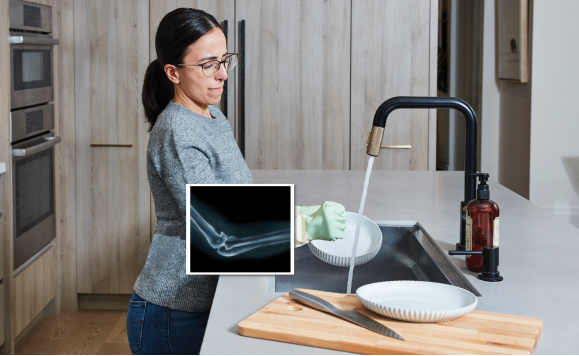The symptoms of XLH can change over time
Because XLH is a progressive condition, it’s important to manage it as soon as possible. Even if symptoms seem mild, they will likely change and can worsen over time. Your healthcare team will come up with XLH management options that work best.
Managing XLH in adults
As soon as XLH is diagnosed, the next step will be to discuss management options and goals with your healthcare team.
Management goals for adults with XLH
Your doctor may go over some goals to address some symptoms:
- Musculoskeletal pain
- Pseudofractures and fractures
- Dental issues
- Biochemical evidence of osteomalacia with an increase in serum levels of bone-specific alkaline phosphatase (ALP)

*Actual adult XLH patient.
Support for adults
Physical symptoms in childhood can build up and lead to even more symptoms in adulthood. Sometimes, physical symptoms of XLH can worsen. In these cases, you may need additional ways of managing them.
Managing physical symptoms in adults
Bone and joint pain and stiffness
- Physical therapy may help relieve pain and stiffness by improving the stability and flexibility of joints and muscles.
- Occupational therapy may also be helpful in improving your ability to perform daily activities.
Staying active and doing exercises like yoga may help relieve stiffness. Consult with your doctor before starting any physical activity.
Fractures and pseudofractures
Seek medical attention immediately if fractures or pseudofractures are suspected.
Dental health
- Set up regular dental check-ups (at least yearly) with a dentist.
Be diligent about brushing and flossing, and try to avoid sugary snacks and foods.
Difficulty hearing
Seek help from a doctor if there is any difficulties with hearing, such as ringing in your ears or dizziness (vertigo).
Beating fatigue and staying productive
- Note your energy levels throughout the day and keep a record when you start feeling tired.
- Take breaks or meditate as needed to help reenergize your mind and body.
- Stay active. Regular activity in the form of walking, stretching, or yoga can give you energy. Consult with your doctor first about the types of exercise that may be right for you.
- Establish a sleep routine. A good night’s sleep can help the mind and body.
Don't be afraid to ask for expert advice if you notice that your energy levels remain unchanged.
Looking after your well-being
- Cultivate healthy relationships with family, friends, coworkers, and other people who make you feel good. They may be able to offer support that helps you stay grounded.
- Find your voice and share your struggles with loved ones.
- Reframe your thinking around a stressor to help manage your emotions.
- Express gratitude for the small victories and focus on the present.
Connect with the XLH community and other people with similar experiences to find additional support.
Navigating the workplace
- Remember that there are laws in place to protect you and guarantee certain rights in the workplace.
- Familiarize yourself with your rights.
- If you choose to disclose your condition to an employer, you can request accommodations to help you do your job successfully.
- Talk to an expert if you need advice on navigating the workplace.
Be sure to research and understand your health insurance options.
Planning for a family
- Before having a child, be sure to understand how XLH can be passed down in families.
- If you are a woman with XLH considering pregnancy, consult an obstetrician to discuss any potential health risks to you.
- If you decide to have a child, consult a genetic counsellor to understand the XLH inheritance pattern and learn about reproductive options.
Choose what is best for your family planning. Whether or how you start a family is your choice.

 Français
Français